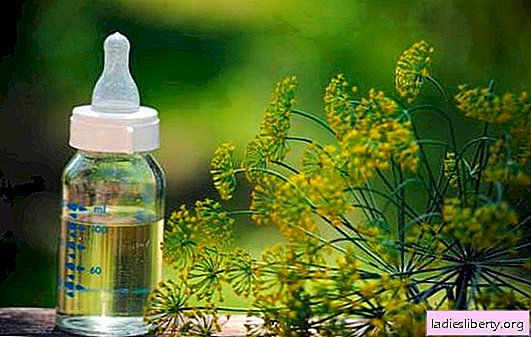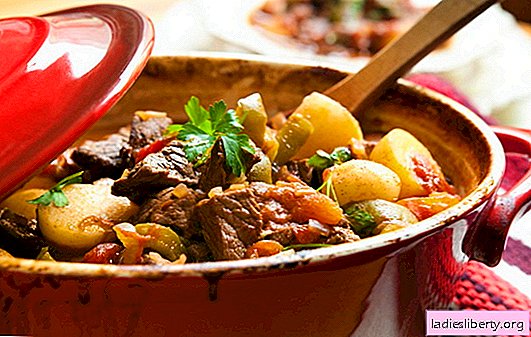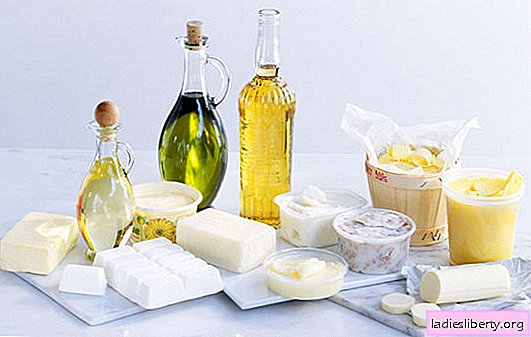
The first months after giving birth are considered the most difficult. His body adapts to life outside the mother’s abdomen. The most difficult is the addiction of the gastrointestinal tract to breast milk or mixture. If something goes wrong, three weeks after birth, the baby begins to suffer from bloating and increased gas formation, which causes intestinal colic. And the question arises before mother: how to alleviate this condition of the child?
Dill water for babies from colic: composition and benefits
Usually colic in infants appears in the first month of a child's life. They are expressed in the concern of the child. He begins to squeeze his legs and cry a lot. Usually, the baby’s tummy bothers the baby shortly after feeding and in the late afternoon. In this case, dill water will come to the aid of the parents. It enhances the intestines, its motility, which contributes to the promotion of gases that bother the baby.
I must say that now in any pharmacy you can find many different products for babies from birth, which relieve colic. However, the most simple and well-known remedy is dill water. But is it really effective?
First you need to decide why the dill water. To the dill, which immediately appears, this has nothing to do. The water from colic is made from fennel seeds - a plant that has another name - "pharmacy dill." Among medicinal herbs, he occupies a leading position in the fight against colic.
Seeds have a rich composition of vitamins (A, C, B, P), mineral salts (iron, phosphorus, potassium and calcium), esters, flavanoids, saccharides, volatile and other useful substances. Thanks to this composition, dill water helps to cope with bloating and gas formation not only in newborns, but also in adults. By the way, nursing mothers can also drink it to increase lactation.
How to give dill water from colic to babies
You can start giving dill water to the baby only after he reaches the age of two weeks. First give 1 tsp. dill water between feedings. Usually the drink does not cause an allergic reaction. To verify its absence, you must first give a teaspoon of dill water to the baby and look at the reaction during the day. If during this time the baby’s condition has not changed, then you can safely give water. If an allergy occurs, keep in mind that an antihistamine should always be available.
Newborns are given 1 tsp. dill water 3 times a day between feedings. If you notice that there was no effect from water intake, you can increase the number of doses up to 5 times a day. It happens that the body is used to water and after some time, colic still bothered the child, although you continue to give dill water, in this case, increasing the dosage helps. For example, start giving 0.5 tsp for a while. more. With the growth of the baby, the dosage of water needs to be increased. If the colic has stopped, then giving water does not make sense and you need to stop. Expectant and new mothers need to be patient, the colic and anxiety of the child will stop closer to 6 months because of this. It was by this time that the adaptation of a small organism to a new environment had already ended, and the "processing" of milk did not cause problems.
If a child refuses to drink some water from a spoon, trick him by mixing dill water into expressed breast milk or a mixture.
Dill water from colic: recipes for cooking at home
Dill water from colic is sold in any pharmacy. It is sold dry in bags. Ready water can be stored in the refrigerator for up to seven days. However, if you brew bags, it is better to cook for the day, dividing the volume into several receptions.
Dill water can be bought at almost any pharmacy. There are also many remedies for colic, which contain fennel seeds. If for some reason this remedy was not found in the pharmacy, then you can prepare the water yourself.
Dill water from fennel seeds
For this, 1 tsp. fennel seeds pour a glass of boiling water. Water is infused for 1.5 hours. Then the water is filtered, poured into a baby bottle and stored in the refrigerator.
Dill water from fennel essential oil
Essential oil of pharmaceutical dill is also suitable for preparing water from colic. To do this, you need 0.05 g of essential oil. It is dissolved in 1 liter of warm boiled water. The solution can be stored in the refrigerator for up to 1 month. But it is worth remembering that before serving the baby, it should be heated.
By the way, water from colic can also be prepared from ordinary dill. Cooking and proportions are similar to fennel seeds.
If there are no seeds, but there is fresh dill, then you can make dill tea for your baby from colic. Dill greens are crushed in a blender or simply finely chopped with a knife, then pour 100 ml of boiling water. The drink is infused for an hour, then filtered, cooled and ready to drink. Give in the same way as dill water.
It is also worth noting some of the nuances of cooking. Dishes in which dill water is prepared must first be dipped in boiling water. And the water should only be purified and boiled. Children under one month old are given only freshly prepared water.
Dill water from colic: are there any contraindications?
Among mothers who know firsthand what childhood colic is, there are different opinions. Some argue that dill water is the best remedy, others note its uselessness. This is actually so. Dill water does not give 100% of the effect of its intake. The thing is that the body of each child is individual, and therefore dill water helps one, on others it has no effect.
Usually dill water does not cause any side effects. However, in some babies it causes an allergic reaction. In this case, you should immediately stop giving dill water and start giving an anti-allergic drug.
Also, many mothers noted that after taking dill water, the babies begin to swell greatly. If you notice such a problem, pause for a while or completely abandon dill water.
Despite the few, but still available side effects from taking dill water, still in most cases it very much helps the child cope with colic and bloating. However, before starting to give water, try to eliminate the causes of problems with the tummy. For example, if the newborn is breast-fed, then the mother should review her diet and exclude foods that may bother the baby.
In children on artificial feeding, colic can cause a milk mixture. Maybe you should try a mixture of another company.
In general, frequent visits to the pediatrician are required in the first months of a child’s life. If the baby begins to bother with colic, consult a pediatrician. If serious causes of crying and anxiety of the child are excluded, you can start giving the baby dill water.











